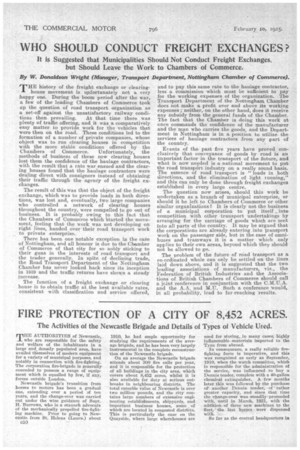WHO SHOULD CONDUCT FREIGHT EXCHANGES?
Page 34

If you've noticed an error in this article please click here to report it so we can fix it.
It is Suggested that Municipalities Should Not Conduct Freight Exchanges, but Should Leave the Work to Chambers of Commerce.
By W. Donaldson Wright (Manager, Transport Department, Nottingham Chamber of Commerce).
TIIE history of the freight exchange or clearing
house movement is unfortunately not a very happy one. During the boom period after the war, a few of the leading Chambers of Commerce took Lip the question of road transport organization as a set-off against the unsatisfactory railway condi
tions then prevailing. At that time there was plenty of traffic offering, and it was a comparatively easy matter. to provide work for the vehicles that -were then on the road. These conditions led to the formation of a number of private companies, whose object was to run clearing houses in competition with the more stable conditions offered by the Chambers of Commerce, Unfortunately, the methods of business of these new clearing houses lost them the confidence of the haulage contractors, with the result that a rate war ensued and the clearing houses found that the haulage contractors were dealing direct with consignors instead of obtaining their traffic through the agency of the freight exchanges.
The result of this was that the object of the freight exchange, which was to provide loads in both directions, was lost and, eventually, two large companies who controlled a network of clearing houses throughout the country, were compelled to go out of business. It is probably owing to this faot that the Chambers of Commerce which 'Started the movement, feeling that the work was not developing on right lines, handed over their road transport work to private enterprise.
There has been one notable exception in the case of Nottingham, and all honour is due to the Chamber of Commerce of that city for so nobly sticking to their guns in the interests of road transport and the trader generally. In spite of declining trade, the Road Transport Department of the Nottingham Chamber has never looked back since its inception in 1919 and the traffic returns have shown a steady increase.
The function of a freight exchange or clearing house is to obtain traffic at the best available rates, consistent with classification and service offered,
and to pay this same rate to the haulage contractor, less a commission which must be sufficient to pay for the working. expenses of the organization. The Transport Department of the Nottingham Chamber does not make a profit over and above its working expenses' neither, on the other hand, does it receive any subsidy from the general funds of the Chamber. The fact that the Chamber is doing this work at once commands the confidence of the manufacturer and the man who carries the goods, and the Department in Nottingham is in a position to utilize the services of haulage contractors from any part of the country.
Events of the past five years have proved conclusively that conveyance of goods by road is an important factor in the transport of the future, and what is now needed is a national movement to put the road transport industry on a really sound basis. The essence of road transport is "loads in both directions, and the elimination of light running," and this can only be done through freight exchanges established in every large centre.
The question now arises, should this work be undertaken as a branch of municipal enterprise, or should it be left to Chambers of Commerce or other similar organizations? It is clearly not the business of a municipal corporation to put itself into competition with other transport undertakings by arranging for the carriage of goods which are sent into all parts of the country. It may be argued that the corporations are already entering into transport work on the passenger side, but in the case of omnibuses and tramways it is a matter which only applies to their own areas, beyond which they should not be allowed to .go.
The problem of the future of road transport as a co-ordinated whole can only be settled on the lines laid down above, and it is suggested that the two leading associations of manufacturers, viz., the Federation of British Industries and the Associations of British Chambers of Commerce should call jcint conference in conjunction with the C.M.U.A. and the A.A. and MJJ. Such a conference 'Would, in all probability, lead to far-reaching results.














































